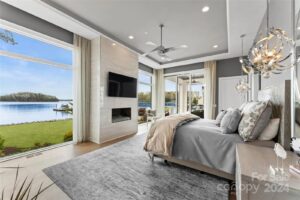 Buying your first home in Charlotte is one of the most exciting, and daunting, experiences you can have. Between rising interest rates, tight inventory, and fierce competition, the process can feel like a full-time job. But what really determines whether you’ll love your home long-term often comes down to the details most people overlook.
Buying your first home in Charlotte is one of the most exciting, and daunting, experiences you can have. Between rising interest rates, tight inventory, and fierce competition, the process can feel like a full-time job. But what really determines whether you’ll love your home long-term often comes down to the details most people overlook.
As you walk through open houses, it’s easy to get distracted by staging and square footage. Yet the smartest first-time buyers are starting to think past the floor plan, examining energy efficiency, long-term maintenance, and neighborhood dynamics. Whether you’re updating fixtures or upgrading features like windows and doors through KobyCo Door & Window, these decisions can influence not just comfort but future value.
Here’s what new buyers in the Queen City should keep in mind.
The Charlotte Market Reality
Charlotte’s population growth hasn’t slowed down, it’s only shifted. Young professionals, remote workers, and families continue to move in from across the country, attracted by job opportunities, affordability, and lifestyle.
But while demand remains strong, supply lags behind. New builds are popping up from Huntersville to Indian Land, yet competition for move-in-ready homes in established neighborhoods like NoDa, Plaza Midwood, and SouthPark is intense.
That imbalance means first-time buyers must be sharper than ever. A solid pre-approval, local agent, and realistic expectations are essential, but so is knowing how to evaluate a property’s true condition.
Look Past the Paint
The easiest trap for new buyers? Falling for cosmetics. Fresh paint and trendy light fixtures are designed to charm, but they rarely tell the full story.
Instead, pay attention to the structure, the foundation, roof, plumbing, and electrical systems. In Charlotte’s humid climate, even small maintenance issues can escalate fast.
Don’t hesitate to ask about insulation, HVAC age, or recent window replacements. Many older homes lose efficiency through outdated materials, which can lead to higher utility bills and discomfort. Investing in upgrades early, especially energy-saving ones, can pay off over time.
Location Means Lifestyle
Every Charlotte neighborhood has its own rhythm, and the right fit depends on how you live.
- South End: Walkability, nightlife, and access to the Rail Trail attract young professionals.
- Ballantyne: Suburban amenities and family-friendly schools dominate.
- NoDa: Creative, artsy, and community-driven.
- Huntersville and Concord: More space, lower prices, but longer commutes.
When choosing your first home, remember, you’re not just buying property; you’re buying a lifestyle. Drive through the neighborhood at different times of day. Talk to neighbors. Check traffic patterns and grocery store proximity. The right area can make daily life smoother, especially if you plan to stay for years.
Think Energy Efficiency and Maintenance
In Charlotte’s humid summers and unpredictable winters, energy efficiency can make or break your comfort level. Drafty windows, poor sealing, and outdated HVAC systems can lead to high utility bills.
According to the National Association of Realtors, energy-efficient features can boost resale value by as much as 10% while reducing monthly expenses. For first-time buyers, that’s a double win.
If the home you’re considering is older, don’t let that scare you, but budget for updates. Upgraded windows, doors, and insulation dramatically improve performance while reducing long-term costs. They also make a home feel quieter and more secure, perks that new homeowners quickly learn to appreciate.
Inspect Before You Invest
A professional inspection isn’t optional, it’s protection. Even new constructions can have hidden issues, from plumbing misalignments to poor drainage.
Hire a licensed local inspector who knows Charlotte’s soil types, building codes, and common regional problems. Look for red flags like foundation cracks, moisture in crawl spaces, and uneven flooring.
If repairs are needed, request quotes before closing. You can sometimes negotiate seller credits or lower prices based on the findings, saving you thousands down the line.
Budget Beyond the Mortgage
Image from Unsplash
First-time buyers often underestimate ongoing costs. Mortgage, insurance, and taxes are only part of the picture. HOA dues, utilities, landscaping, and repairs add up quickly.
A good rule of thumb: set aside 1% of your home’s value each year for maintenance. That means if your home costs $400,000, you should expect to spend around $4,000 annually on upkeep.
The key is proactive planning. Replacing aging doors and windows before they fail, or scheduling seasonal inspections, prevents costly emergencies later.
Emotional Readiness Matters, Too
Buying a home isn’t just financial, it’s emotional. The process can be overwhelming, with bidding wars and shifting expectations. It’s easy to second-guess every decision.
That’s why it helps to stay focused on what really matters: long-term comfort, security, and value. The right home will feel right not because it’s perfect, but because it aligns with your lifestyle and priorities.
Take your time, stay flexible, and remember that your first home doesn’t have to be your forever home.
The Bigger Picture
Charlotte’s housing landscape continues to evolve, and first-time buyers are part of that story. With a little preparation and a lot of perspective, you can make smart decisions that protect both your wallet and your peace of mind.
So, as you tour homes this season, don’t just look at floor plans and finishes. Look for potential. Look for efficiency. Look for the details that will make your new house a home, one that grows with you, reflects your life, and fits the future you’re building in the Queen City.


